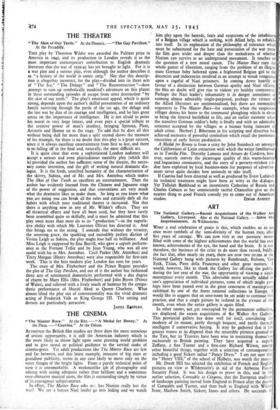THE CINEMA ALTHOUGH the British film studios are these days
the more conscious of artistic opportunity, it is still the American industry which is the more likely to throw light upon some pressing world problem and to give moral or political guidance to the serried ranks of cinema-goers. Yet adult productions like The Master Race are few and far between, and this latest example, innocent of big stars or _grandiose publicity, seems in any case likely to move only on the outer fringes of the bright lights. From a purely technical point of view it is unremarkable. A workmanlike job of photography and editing with acting adequate rather than brilliant and a sometimes over-obtrusive musical score, the film is outstanding simply by virtue of its courageous subject-matter. In effect, The Master Race asks us: has Nazism really lost the war? We see a beaten Nazi leader go into hiding and we watch " him play upon the hatreds fears and suspicions of the inhabitants of a Belgian village which is seeking, with Allied help, to rehabili- tate itself. In its exploration of the philosophy of 'tolerance which must be substituted for the hate and persecution of the war years the film goes wider and deeper than the melodrama of whether Nazism can survive as an underground movement. It touches on the question of a new moral canon. The Master Race runs the whole gamut of liberation, ranging from the problem of an illegiti- mate German baby fathered upon a frightened Belgian girl to the decencies and indecencies involved in an attempt to wreak vengeance upon a cageful of Nazi prisoners. In coming down heavily in favour of a distinction between German apathy and Nazi virainy, the film no doubt will give rise to violent yet healthy controversy. Perhaps the Nazi leader's inhumanity is in danger sometimes of seeming almost admirably single-purposed, perhaps the virtues of the Allied liberators are sentimentalised, but ,there are memorable sequences in The Master Race—for example, when the suspicious villager denies his horse to the communal ploughing which is about to bring the littered battlefield to life, and an earlier moment when the nameless German soldier's baby is finally and with an admirable reticence accepted by the villages as a human being innocent of adult crime. Herbert J. Biberman in his scripting and direction has achieved moments of powerful symbolism which recall the passionate sincerities of early Soviet production.
A Medal for Benny is from a story by John Steinbeck set amongst the Californians of Latin extraction with which the writer familiarised us in Tortilla Flat. Dorothy Lamour and Arturo de' Cordova, how- ever, scarcely convey the picaresque quality of this warm-hearted and loquacious community, and the story of a poverty-stricken s)l- dier hero exploited by local business-men for purposes of advertise- ment never quite decides how seriously to take itself. If Czarina had been directed as well as produced by Ernst Lubitsch its technical treatment might have been as witty as the dialogue. Yet Tallulah Bankhead as an incontinent Catherine of Russia and Charles Coburn as her omnisciently tactful Chancellor give us the nearest thing to good French comedy yet to come out of American studios.
EDGAR ANSTEY.


























 Previous page
Previous page